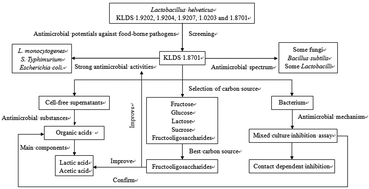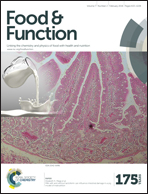In vitro assessment of the antimicrobial potentials of Lactobacillus helveticus strains isolated from traditional cheese in Sinkiang China against food-borne pathogens
Abstract
Lactobacillus helveticus, an obligatory hetero-fermentative LAB, is Generally Recognized as Safe (GRAS) and is gaining popularity for application in dairy products. Lactic acid bacteria (LAB) play a remarkable role in inhibiting the growth of pathogenic bacteria in food products, without disturbing the sensory attributes of the food. In this study, the screening of the antimicrobial potential of Lactobacillus helveticus KLDS 1.8701 against four food-borne pathogens including Listeria monocytogenes ATCC 19115, Salmonella typhimurium ATCC 14028, Staphylococcus aureus ATCC 25923, and Escherichia coli O157:H7 ATCC 43889 in vitro was inspected using the Oxford cup method and mixed culture inhibition assays. The organic acid production and antimicrobial potential of the cell-free supernatants (CFS) have been evaluated via different treatments and analysis using high performance liquid chromatography (HPLC). The analysis results revealed that KLDS 1.8701 exhibited the highest antimicrobial potential compared to other antimicrobial strains. The antimicrobial activity of KLDS 1.8701 resulted from the organic acids in the culture and CFS. From the study, it was found that carbon sources, as well as organic acid production, accelerate the antimicrobial activity of KLDS 1.8701 and the fructooligosaccharides (FOS) were considered the best for improving the proliferation of KLDS 1.8701 and supporting its antimicrobial action. Results of the mixed culture inhibition assays showed that part of the antimicrobial activity resulted from the inhibitory action of the bacteria itself in culture, and this action required cellular contact between the food-borne pathogens and KLDS 1.8701. Conversely, the results of the antimicrobial spectrum assay revealed that some Lactobacilli remained unaffected by KLDS 1.8701. KLDS 1.8701 might also be favorable for use as a supplementary starter in fermented dairy productions. Furthermore, KLDS 1.8701 could survive well under GI tract conditions. Further studies on in vivo inhibition assays and the probiotic effects are recommended.


 Please wait while we load your content...
Please wait while we load your content...